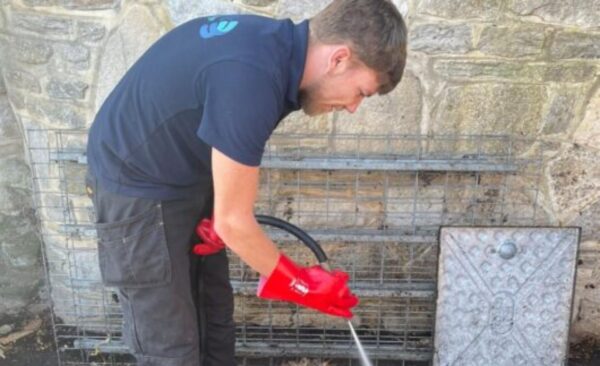
Dynamic Drainage’s blocked drains solutions
There are a number of solutions that we use here at Dynamic Drainage in order to unblock our customer’s drains. In this blog, we will go into detail about not only how we do this but also the reasons why your drains may get clogged in the first place so that you can help to prevent it from happening in the future.
So what can cause a blocked drain?
There are a number of things that can block your drains, some being more common than others, but all of them can be fixed by our expert team of professionals.
Without further ado, let’s look at some of the reasons why it happens.
Tree Roots
This is the usual suspect in blocked water and sewer mains as it is common to find tree roots in pipes of older homes.
However, the roots can invade any pipe system of any age as tree roots are naturally drawn to seek out water wherever they may find it. So, if many trees are surrounding your home, it is crucial that you look out for tree root invasion.
The best thing that can help you with that is hiring our team to carry out a video inspection as this can help to check out if your drainage is prone to a tree root attack and is one of the best-blocked drain solutions.
Paper Products
Be it toilet paper, light cardboard, paper, towel, facial tissue, baby diapers, feminine hygiene products or even ‘flushable wipes’, these products can be detrimental to the drainage system. They do not disintegrate when flushed and can only fit into the pipe because they are non-biodegradable which means that these materials pose a threat to home and commercial systems. Feminine hygiene products and baby diapers are made with cotton and other fibres that have a high tendency to attract other potential blocking agents and block the drains.
With the way sewer treatment is designed, it contains microorganisms that disintegrate human waste and nothing else which is why you need to avoid putting non-biodegradable materials down the toilet.
Kitchen Waste
Waste from the kitchen, including food particles, fat, oil, and grease, are not friends with any plumbing system.
The truth is that even though water flushes away fats, they are still sticky and will eventually bind to the pipe and build up a blockage. It is recommended that you trash grease and other fats and oil by putting them in small disposable packages and throwing them away in the trash bin.
You need to understand that not all foods are compatible with garbage disposal systems, no matter how powerful they may be. The function of the garbage disposal system is to cut up food waste into bits that will move through the drain pipe without any accumulation, but many of our foods are not easy to shred.
We highly encourage you to avoid flushing any food particles or waste down the bathtub, laundry drains or the toilet. This is because some of these particles could be hard, sticky, or stringy which is not good in any water pipe.
This is very important, especially to restaurant owners as you wouldn’t like food preparation to be delayed or hindered because of a blocked drain.
Therefore our advice would be to take time to teach your employees about what does and does not belong in the drain.
Hair
The hair that falls off your body as you bathe or shave can accumulate and cause slow water flow or a complete blockage. You can protect your drains with small screens and by sweeping hair out of sinks.
Most of the time, you can try using needle-nose pliers or long tweezers to pull out accumulated hair from the drain carefully which your plugs will appreciate greatly.
Scales from Pipe
Mineral deposits from dissolved calcium and magnesium and other metallic compounds left behind as water flows can build up to block your drains. Scales are naturally occurring products that react to temperatures and either wet or dry conditions in the pipes. It begins by gathering in one spot until it grows to a large size which then causes a blockage.
Scales can also affect water-using home appliances such as dishwashers and washing machines which makes preventing them that much more important.
Ageing of Pipe
Pipes, over time, can disintegrate and drop. As a result, the soil under them can erode, which in turn allows the pipe to sag. Seasonal changes, especially in winter, can cause pipes to shift under the pressure of the freeze-thaw process which doesn’t just affect old pipes but modern-day pipes can also be affected by this.
Naturally occurring leaves, dirt, sticks, and other things can be blown by the wind or moved by water into broken water pipes. These materials thrive in any breach in plumbing work, which is why it is always advised that you clear your surroundings of all debris, especially during rainy weather. Leaves are excellent drain-blocking agents so, it is advised that you clear your garden of them to avoid washing them down the storm sewer drain.
Even the tiniest amount of weeds can sneak through a very small crack in a pipe, paving the way for roots, plants and soil to come in and block the drain.
Other objects like chunks of bar soap, children’s toys, condoms, dental floss, and jewellery, amongst others, should not be deposited in the drain because they are non-biodegradable. Keep an eye on younger children to ensure they don’t throw any hard objects into the toilet or drain.
A combination of materials like soap and detergents, plus other materials can form a big obstacle and block the drains. Laundry experts recommend the use of soaps not containing phosphate. Rather, use instead soaps that have natural or no surfactants. It is also advised that you wash your clothes in intervals so that you don’t overwork the machine.
Leaks from pipes
This steady loss of water from a pipe can cause erosion of the soil around it, and the pipe may drop, sag or change its original position. Leaking water also changes the soil’s chemical properties, and the pipe might break because of this.
Poor Plumbing
An incorrect sewer slope, undersized sewer pipes and poor load design can affect the drain adversely. This thing should be professionally done to ensure effective waste disposal and minimal drain damage.
The water system is driven by gravity, thus every pipe should have the correct slope to maintain proper flow. The household needs should be considered before sloping drain pipes so that waste and water can be properly processed.
It is also not good to add to a home without balancing the plumbing load. Avoid using poorly trained technicians to do your plumbing because sometimes the plumbing load is miscalculated. The number of water-using utilities like sinks, bathtubs and toilets determines the size of sewer drain pipes. The popularly accepted standard for the main drain of a house is 4 inches in diameter.
Having an overload is possible even if the sewer main has the correct size. This happens when for instance, a home is using a septic system, and its waste capacity has increased. The functions of the septic system and drain field may become overstretched and drain failure sets in. The consequences of this failure are foul smells and backups.
Animal waste like cat litter and dog waste should not go into the drain or toilet! They do not belong there! Cat litter is composed of clay-like material that can harden like concrete over time. The litter pieces are also sharp and can attract other things to block the drain. So, if you own pets like dogs and cats, collect their waste into plastic bags and dispose of them separately to biodegradable waste.
Remember, only water, human waste and biodegradable toilet paper should be flushed down the toilet. All other waste should be disposed of properly.
How do plumbers clear blocked drains?
A manual drain snake, also known as a plumber’s snake or a drain auger, is a small boring tool that rotates slowly as it’s physically pushed through a stubborn clog. The terminal end of the device is a corkscrew-shaped hook that is fed into a clogged drain or toilet.
Regular or routine cleaning of your sewer pipe can help maintain functionality. One may begin to imagine the possibility of cleaning drain pipes that always carry waste. It is possible. Pipe cleaning can be done using hydro jetting, augers, and winding snakes.
There are also home remedies; actions you can take yourself to clear the blockage and maintain your pipes. A good combination of lemon juice, soda, and vinegar can come in handy in taking out some drain blocks. Bear in mind that multiple uses of chemical drain cleaners should be avoided; they are harsh and most often will degrade the insides of the pipes and drains.
In using a snake or auger, you can clear and loosen blockages. This tool is made of steel and has a tip that can grab blockages. It can be electrically, hydraulically, or manually powered. You can use other similar tools like a kinetic water ram for clearing out blocked drains.
Thank you for reading this blog on ‘Dynamic Drainage’s blocked drains solutions’. We hope that this blog has helped you be more aware of factors that could harm your home and cause problems for you. If you need help with any of the issues we have talked about in this blog, get in contact with us today via our website where one of our experts will be able to help you.
Continue reading
continue reading
Related Posts
Blocked drains in Chichester can cause inconvenience and disruption to […]
Our Expert Tips If you’ve accidentally damaged a drain or […]
When it comes to choosing a company for your drainage […]





